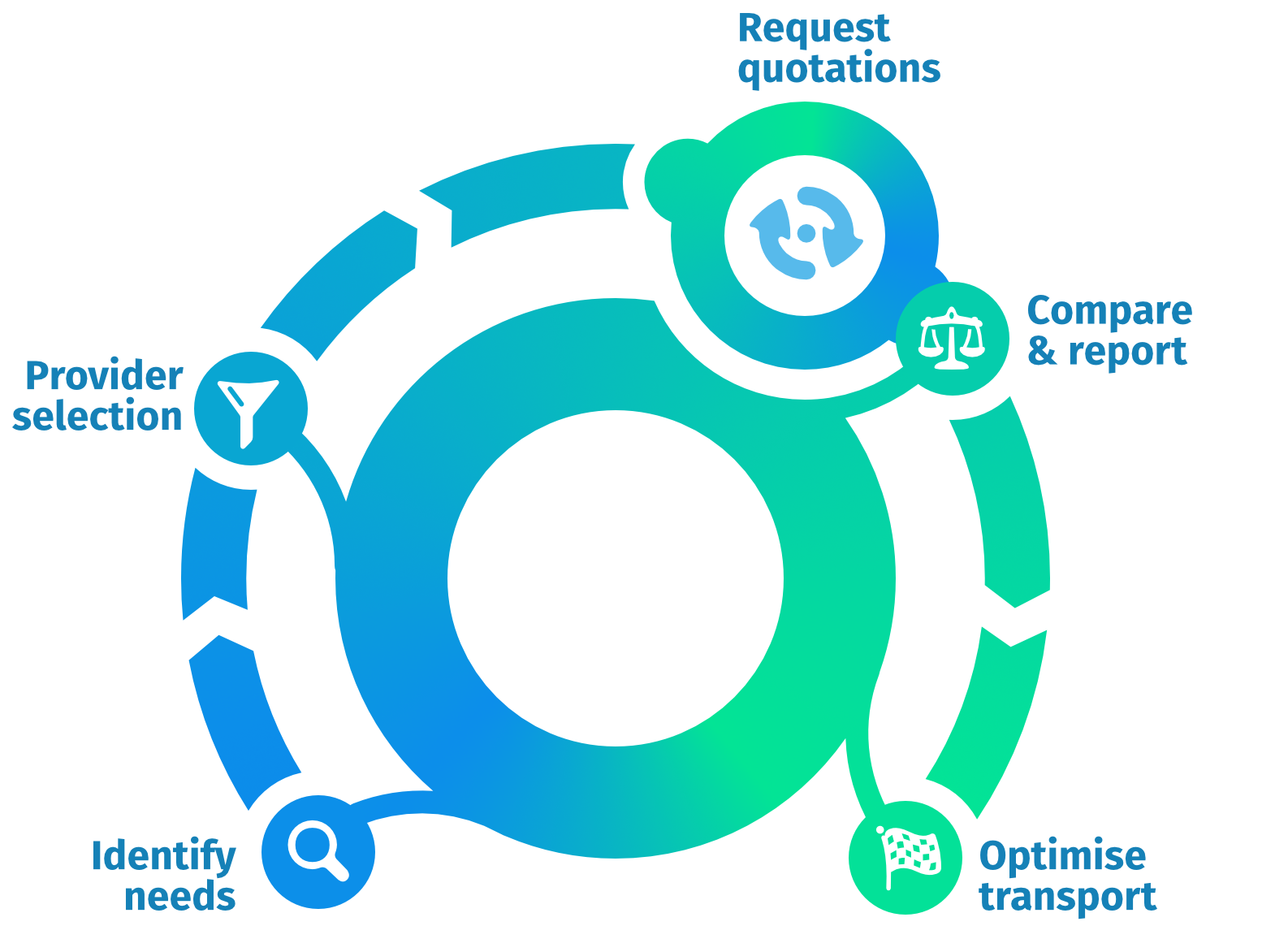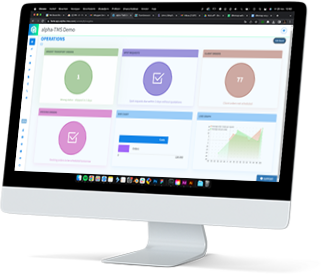Tendering in logistics is frequently misunderstood. Often reduced to spreadsheets and price comparisons, the process is too often treated as a purely transactional exercise. But when executed with care and strategy, a transport tender becomes something much more: a tool for long-term value creation and building the right transport partner relationships. Choosing a transport partner is not just about price – it’s about reliability, service quality, and strategic fit with your supply chain.
At Transinnovate, we work with companies across industries to rethink how they approach transport procurement and how they select their transport partners. Whether you’re a global manufacturer or a regional distributor, your supply chain deserves more than lowest-bid logic. A well-structured tender doesn’t just secure better rates – it aligns you with transport partners who share your values, can scale with your business, and support your long-term goals.

Let’s Build Something Better Together
Whether you’re launching your first transport tender or looking to improve an existing process, the key is structure, clarity, and the right transport partner.
With Transinnovate, you’re not just getting tools — you’re getting a strategy, tailored support, and guidance in choosing the transport partner that fits your business and long-term goals.
Don’t settle for spreadsheets and guesswork. Take the first step toward smarter, more strategic transport procurement and stronger transport partner relationships today.
From Tendering to Partnering: A Mindset Shift
The term “tender” often sounds mechanical and impersonal. It conjures ideas of anonymous competition, minimal communication, and price-only decision making. Meanwhile, “partnership” evokes trust, shared goals, and collaboration with a reliable transport partner.
In reality, the two should not be separate. If designed well, a tender is the first step in building a partnership with the right transport partner, not just buying a service. It’s the structured process of finding a provider that not only meets your current requirements but also complements your organization’s operating style, communication needs, and future ambitions.
Think of it less like an auction, and more like a search for a co-pilot – a true transport partner who will navigate the future with you, adapt when conditions change, and remain aligned as your business evolves.
Don’t Start Blind: Know What You Really Need
Launching a transport tender without first having a clear understanding of your actual needs is like going on a blind date with no idea what you’re looking for in a long-term transport partner.
Before inviting carriers to bid, take the time to do an internal diagnostic:
-
What lanes do you operate – and how stable are they?
-
Are there seasonal fluctuations or growth forecasts that require flexibility?
-
What kind of cargo do you handle – standard, temperature-controlled, hazardous?
-
Do you need last-mile capabilities? Warehousing integration? Customs support?
-
What KPIs matter most to your business: on-time delivery, damage rates, responsiveness?
Only when your internal needs are clearly defined can you build a tender process that leads to relevant, sustainable outcomes with the right transport partner.
Many failed partnerships stem not from poor execution, but from poor alignment between expectations and reality. Avoid that by knowing – and documenting – what success looks like with your future transport partner.
Strategic Pre-Selection: Less is More
It may seem inclusive to invite a wide pool of carriers to your tender – but casting too wide a net often leads to inefficiency, frustration, and poor fit.
Instead, aim for strategic pre-selection: a curated list of carriers and potential transport partners that meet baseline requirements and have proven capacity, capability, and cultural fit for your business.
This smaller, focused pool enables:
-
Higher-quality proposals
-
More meaningful conversations
-
Stronger competition based on relevant value
-
Greater efficiency for both your team and the bidders
At Transinovate, we help shippers run market intelligence assessments and pre-qualification rounds that result in leaner, smarter RFP processes. We don’t just recommend who to invite – we explain why they’re a strong transport partner match.
Already Have a Partner? Great – Now Validate the Fit
“We’ve been working with the same carrier for years, and things are fine.”
That’s great – but even the best relationships benefit from reflection. A tender doesn’t mean you’re looking to replace your current transport partner. It means you’re willing to validate that the relationship still works for both sides.
Think of it like a strategic review or health check. Markets change. Volumes shift. Expectations evolve. What worked five years ago might now be holding you back.
A well-run tender can reaffirm that your existing transport partner is still the right fit – and give you new ways to grow together.
In many cases, tenders result in renewals, not replacements – just with improved clarity, better SLAs, and modernized contract terms.
Chemistry First, but Price Still Matters
In logistics, as in life, chemistry matters. Can you work together under pressure? Are communication styles compatible? Do both parties have shared views on risk, quality, and growth with the same transport partner mindset?
But just like relationships, chemistry alone isn’t enough – the numbers have to work too.
Too often, companies fall into two traps:
-
Choosing the cheapest bid – and suffering later in performance, availability, or flexibility
-
Choosing the most expensive, thinking high cost always means high quality
The right approach balances cost with capability:
-
What are you paying for – and is it measurable?
-
What risk does the provider absorb, and at what price?
-
Does the bid include soft value like real-time visibility, proactive communication, or customized solutions?
At Transinovate, we help evaluate not just rates, but the total cost of ownership – which includes time, reputation, service disruptions, and internal overhead when working with a transport partner.
Raise the Bar Through Transparency
Too many tenders end with radio silence for non-selected bidders. This damages relationships and discourages future participation from quality providers.
Instead, professionalize your process:
-
Provide structured feedback
-
Highlight gaps between requirements and responses
-
Share summary insights with all participants
This shows respect, builds goodwill, and raises the quality of the market for the future. The more vendors understand your real needs and standards, the better their future proposals will be as potential transport partners.
And for those you select – invest time in a strong onboarding process. Document shared KPIs, escalation paths, reporting cadence, and review checkpoints. Every strong relationship with a transport partner starts with clarity.
Rethinking the Role of the Tender
The most successful transport tenders are not about savings – they’re about structure. They reduce chaos, clarify expectations, improve service reliability, and deepen partnerships between shipper and transport partner.
A good tender:
-
Aligns internal stakeholders
-
Creates structured comparisons across providers
-
Exposes hidden inefficiencies in the current setup
-
Leads to measurable service improvement – not just lower rates
At Transinovate, we believe that tenders are not about replacement – they’re about evolution in how you work with your transport partners.
Final Thoughts: Treat Your Tender as a Relationship Investment
When you treat the tender as a strategic relationship-building process, everything changes. You stop treating providers as interchangeable vendors – and start recognizing them as potential value creators, risk mitigators, and growth-focused transport partners.
If you’re ready to take a smarter, more strategic approach to your transport procurement, we’re ready to help.
Ready to Transform Your Transport Procurement?
Whether you’re planning a full tender or just want to explore your options, Transinovate is your partner for smarter logistics procurement and finding the right transport partner.
Contact us today to begin shaping your next transport partnership with a trusted transport partner.




